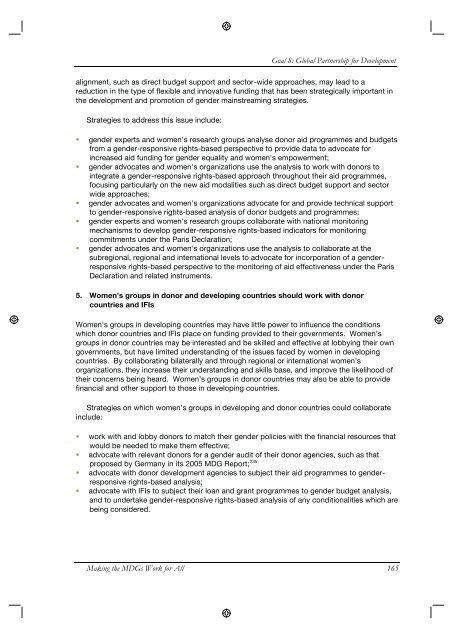Goal 8 - CEDAW Southeast Asia
Goal 8 - CEDAW Southeast Asia
Goal 8 - CEDAW Southeast Asia
Create successful ePaper yourself
Turn your PDF publications into a flip-book with our unique Google optimized e-Paper software.
<strong>Goal</strong> 8: Global Partnership for Development<br />
alignment, such as direct budget support and sector-wide approaches, may lead to a<br />
reduction in the type of flexible and innovative funding that has been strategically important in<br />
the development and promotion of gender mainstreaming strategies.<br />
Strategies to address this issue include:<br />
gender experts and women's research groups analyse donor aid programmes and budgets<br />
from a gender-responsive rights-based perspective to provide data to advocate for<br />
increased aid funding for gender equality and women's empowerment;<br />
gender advocates and women's organizations use the analysis to work with donors to<br />
integrate a gender-responsive rights-based approach throughout their aid programmes,<br />
focusing particularly on the new aid modalities such as direct budget support and sector<br />
wide approaches;<br />
gender advocates and women's organizations advocate for and provide technical support<br />
to gender-responsive rights-based analysis of donor budgets and programmes;<br />
gender experts and women's research groups collaborate with national monitoring<br />
mechanisms to develop gender-responsive rights-based indicators for monitoring<br />
commitments under the Paris Declaration;<br />
gender advocates and women's organizations use the analysis to collaborate at the<br />
subregional, regional and international levels to advocate for incorporation of a genderresponsive<br />
rights-based perspective to the monitoring of aid effectiveness under the Paris<br />
Declaration and related instruments.<br />
5. Women’s groups in donor and developing countries should work with donor<br />
countries and IFIs<br />
Women’s groups in developing countries may have little power to influence the conditions<br />
which donor countries and IFIs place on funding provided to their governments. Women’s<br />
groups in donor countries may be interested and be skilled and effective at lobbying their own<br />
governments, but have limited understanding of the issues faced by women in developing<br />
countries. By collaborating bilaterally and through regional or international women’s<br />
organizations, they increase their understanding and skills base, and improve the likelihood of<br />
their concerns being heard. Women’s groups in donor countries may also be able to provide<br />
financial and other support to those in developing countries.<br />
Strategies on which women’s groups in developing and donor countries could collaborate<br />
include:<br />
work with and lobby donors to match their gender policies with the financial resources that<br />
would be needed to make them effective;<br />
advocate with relevant donors for a gender audit of their donor agencies, such as that<br />
proposed by Germany in its 2005 MDG Report; 235<br />
advocate with donor development agencies to subject their aid programmes to genderresponsive<br />
rights-based analysis;<br />
advocate with IFIs to subject their loan and grant programmes to gender budget analysis,<br />
and to undertake gender-responsive rights-based analysis of any conditionalities which are<br />
being considered.<br />
Making the MDGs Work for All 165

















